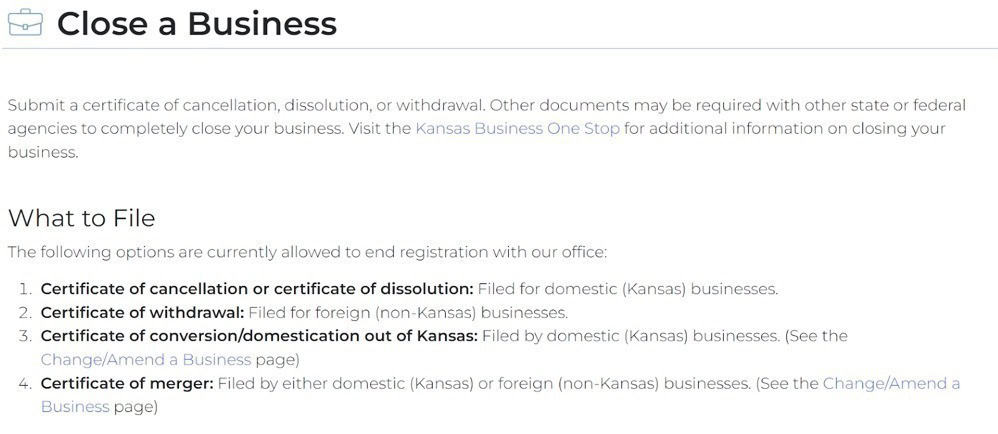It can be very challenging when you need to know how to dissolve your LLC in Kansas. However, when it comes time to do so, you need to understand the “wind up” period and how to make sure everything has been implemented the right way. There’s a specific process to be followed, and failing to do that can put you at risk for fines and other penalties.
Fortunately, we can help you avoid all that and understand how to properly dissolve LLC in Kansas in order to reduce your risk. You’ll learn about the different kinds of LLC dissolution options, the steps you need to follow, and what Kansas requires of you. Here’s everything you need to know about shutting down and dissolving your Kansas Limited Liability Company (LLC).
Basics of LLC dissolution
When you want to shut your business down and you need to officially dissolve your LLC with the state you have to go through the act of dissolution. That removes the independent legal status of your LLC by canceling it through the Kansas Secretary of State. That cancelation can be done either voluntarily or involuntarily.
You want to make sure the state accepts the application for dissolution you give them, which is why you have to follow specific steps first. That can include things like notifying your creditors, paying the debts you owe, notifying federal and local government agencies, and verifying that you’ve paid your outstanding taxes and other bills, so your business entity remains in good standing.
To protect yourself from any future liabilities and dissolve your LLC the right way, following these procedures is crucial.
Types of LLC Dissolution
There are three categories of dissolution: administrative, judicial, and voluntary. Depending on which one of these dissolution types applies to your LLC the procedure you follow will be different. Here’s what to know about each dissolution type.
Administrative dissolution
When you have an administrative dissolution that means the State of Kansas steps in and removes the powers, rights, and authority of an LLC because it failed to comply with its obligations. Some of the reasons that could happen include:
- Failing to submit an annual report at all, or by the due date.
- Failing to pay proper taxes on time (or not paying them at all).
- Failing to maintain a registered agent on file.
Judicial dissolution
Some people refer to judicial dissolution as the “corporate death penalty.” This is the legal process used when a court orders an LLC to dissolve. There are a few specific reasons a court might do this, and the most common ones are:
- Internal disagreements between the members of the LLC.
- Fraud or mismanagement by a member or manager.
- Breaching fiduciary duty.
- An inability to fulfill responsibilities due to death or mental illness.
Voluntary dissolution
If you decide to end your LLC, that’s a voluntary dissolution. Of course, it might not be as easy as deciding to do that and filling out some paperwork. If there are several members and it’s not just you, it may be necessary to have a majority vote in order for a dissolution to move forward. There are two ways this can happen:
- Members can put dissolution triggers (such as the death of a member) into the operating agreement.
- Members can vote for LLC dissolution due to financial problems or internal disputes.
Dissolving your LLC in Kansas
If you decide to have a voluntary dissolution for your Kansas LLC, these are the steps you’ll need to take.
Step 1: Vote to dissolve the LLC
Unless you’re the only member of your LLC, all the members (owners) will need to work together on a voluntary dissolution. Generally, all members need to vote in favor of it or you’ll be required to have a majority decision. In most states that means at least two-thirds of the members have to vote for it, but some states are different.
If your LLC has an operating agreement with pre-agreed dissolution triggers, though, that can be used in place of a majority decision. An LLC that doesn’t have this language in their agreement, or doesn’t have an agreement at all, will need to default to the Kansas state statutes on the matter.
Single vs multi-member LLC dissolution
Single-member LLCs only need the decision of the member/owner in order to start the dissolution process. Multi-member LLCs need a majority vote before they can be dissolved.
Dissolution rules in your LLC operating agreement
Having an LLC operating agreement Kansas is important, and it should have more than just the internal rules for running the business. How to dissolve that business should also be included. Some of the rules that can be included in this agreement are:
- How many members have to approve the dissolution (or what percent of members).
- How the LLC’s activities will be settled and closed.
- How the LLC will discharge its liabilities.
- The way members will cancel contracts, handle debts, and divide any remaining assets.
Step 2: Wind up all business affairs and handle any other business matters
Part of an LLC dissolution involves winding up your business’ affairs. Taking the time to do this properly is vitally important to successfully closing your LLC and ensuring that you won’t have fines or penalties from not shutting it down properly. Some of the things you should consider doing include:
- If you have a registered agent, you’ll need to notify them.
- You’ll want to inform customers and supplies that you’re closing your business.
- If you have permits and business licenses, those will need to be closed.
- Handle any matters involving employees.
- Stop any sales or services you have planned.
- Create a plan to shut down your LLC’s business banking.
Step 3: Notify creditors and claimants about your LLC’s dissolution, settle existing debts and distribute remaining assets
If you own an LLC or are a member of one you have liability protection from debts accrued by that business. If your LLC is having financial problems you can close it, but that doesn’t mean it doesn’t have to pay its debts.
Before you’ll be allowed to dissolve your LLC, you have to make sure to meet the financial obligations it has and allow claimants to collect monies they’re owed. Additionally, any remaining assets need to be split between the members or sold, and how that will be handled is dictated by the LLC operating agreement.
Step 4: Notify Tax Agencies and settle remaining taxes
Your LLC will want to file any final tax returns and obtain tax clearance to ensure that it’s in good standing with the state. That means paying both state and federal taxes, so you’ve met all your obligations in that area.
Step 5: File a certificate of cancelation with the Secretary of State
The final step to dissolve your LLC is to file a certificate of cancelation or certificate of dissolution with the Secretary of State. There are also a few other types of certificates you can file, depending on your specific business details. The options can be found on the “Close a Business” page of the Secretary of State’s website, which looks like this:

There are requirements before filing, and it’s important to ensure that you know what these are so you can move through the process as easily as possible.
It costs $35 to file for dissolution of your LLC, and you can bring that down to $30 if you file online. You can get the forms right online, by clicking on the appropriate one for your needs.
Once you do that you’ll be taken to a form you can fill out, along with filing instructions to follow.
Conclusion
Understanding the legal requirements to dissolve your Kansas LLC is very important. Using our LLC services can help you through this journey. Once you file for a Certificate of Cancelation it’s a pretty straightforward process, but that’s because most of the required work has already been handled before you file that form.
You’ll want to take time to process the closing of your business and the LLC you formed, and look forward to the new opportunities that moving on can bring. The knowledge that you gained during your time operating your business won’t be wasted, and you can carry it forward and consider the best ways to use it for future endeavors.
FAQ
There are a few reasons why dissolving your LLC might be the right choice for your needs. If you have a lot of internal disputes and disagreements between members, for example, dissolution could be the best choice. You may also want to dissolve your LLC if you’re moving to a different state or merging it with another business. Cash flow issues, poor accounting, rising costs for materials, or increased competition in the market are other reasons that some people choose to dissolve their LLCs.
Kansas requires a few of $35 to dissolve your LLC if you mail in the form, and $30 if you process your dissolution online.
You can dissolve your Kansas LLC online or through the mail and the choice is up to you. The Secretary of State handles dissolution for LLCs, but the Kansas Business One Stop page also has excellent information on a number of aspects of business in the state.
It typically takes two to three business days for filings received in the mail, but if you file online it will be processed immediately.
If you don’t take the time to dissolve your Kansas LLC you may have to pay annual fees, taxes, and other expenses. You may also be required to file tax returns and annual reports, and you can be penalized for failing to do this.
When an LLC is registered in more than one state it may find that it’s expected to pay taxes in both (or all) of those states. That can mean double taxation, but a lot of states have credits that help avoid this problem.


